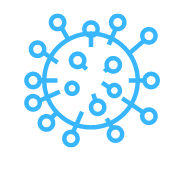What is Respiratory syncytial virus (RSV)? Understanding Respiratory syncytial virus (RSV)
What is Respiratory syncytial virus (RSV)?
Respiratory syncytial virus (RSV) is a common viral infection that primarily affects the respiratory system, particularly the lungs. It can cause symptoms ranging from mild cold-like symptoms to severe respiratory distress, especially in infants and older adults with compromised immune systems.
RSV is highly contagious and spreads through droplets from infected individuals when they cough, sneeze, or talk. It can also be contracted by touching surfaces contaminated with the virus and then touching the nose, mouth, or eyes.
Common symptoms of RSV include coughing, sneezing, runny nose, fever, and sore throat. In severe cases, it can lead to more serious symptoms such as wheezing, difficulty breathing, rapid breathing, and bluish skin due to lack of oxygen.
While most healthy individuals recover from RSV with time and supportive care, it can be more severe in infants and older adults. Premature infants, babies with congenital heart or lung diseases, and individuals with weakened immune systems are at higher risk of experiencing severe complications from RSV.
There is currently no specific treatment or vaccine for RSV. Management typically involves alleviating symptoms and providing supportive care. Preventive measures such as frequent handwashing, avoiding close contact with infected individuals, and following respiratory hygiene practices can help reduce the spread of the virus.
Understanding Respiratory syncytial virus (RSV)
Respiratory syncytial virus (RSV) is a common viral infection that primarily affects the respiratory system, specifically the lungs and airways. It is highly contagious and can cause mild to severe respiratory illness, particularly in infants, young children, and older adults.
RSV is a member of the Paramyxovirus family and is spread through respiratory droplets when an infected person coughs or sneezes. The virus can also survive on surfaces and objects, making it possible to contract the infection by touching contaminated surfaces and then touching the face.
Symptoms of RSV vary depending on the age of the person affected. Infants and young children may experience coughing, sneezing, runny nose, fever, and decreased appetite. In some cases, RSV can lead to more severe symptoms such as difficulty breathing, wheezing, and rapid breathing. Older children and adults typically have milder symptoms similar to a common cold.
While most healthy individuals can recover from RSV with rest and supportive care, it can be more severe for certain populations. Premature infants, infants with underlying health conditions, and older adults with weakened immune systems are at higher risk of developing severe complications from RSV, such as bronchiolitis or pneumonia.
Treatment for RSV is primarily supportive, focusing on relieving symptoms and ensuring adequate hydration and rest. Hospitalization may be required for individuals with severe symptoms or those at high risk for complications. In some cases, antiviral medications may be prescribed.
Prevention is key in reducing the spread of RSV. Good hand hygiene, such as regular handwashing with soap and water, is essential. It is also important to avoid close contact with individuals who are sick, especially in high-risk populations. Vaccines for RSV are currently being developed and tested, although none are widely available as of now.
In conclusion, understanding respiratory syncytial virus (RSV) is crucial in order to recognize its symptoms, take appropriate preventive measures, and seek appropriate medical care when needed. The virus is highly contagious and primarily affects the respiratory system, causing mild to severe illness, particularly in infants and older adults. Supportive care is the mainstay of treatment, and prevention plays a vital role in reducing its spread.
The Impact of Respiratory syncytial virus (RSV)
The Impact of Respiratory Syncytial Virus (RSV)
Respiratory syncytial virus (RSV) is a common respiratory virus that affects people of all ages, but is especially severe in infants and older adults. Here are some key impacts of RSV:
1. Infants and young children: RSV is a leading cause of respiratory infection in infants and young children. It can cause severe symptoms such as coughing, wheezing, difficulty breathing, and fever. In some cases, RSV can lead to more serious conditions like bronchiolitis or pneumonia. Hospitalization rates due to RSV are highest among infants under six months of age.
2. Hospitalizations: RSV is responsible for a significant number of hospitalizations each year, particularly among children and older adults. Severe RSV infections may require oxygen support and respiratory treatment in a hospital setting. These hospitalizations can put a strain on healthcare systems, leading to increased healthcare costs and resource utilization.
3. Long-term respiratory issues: Studies have shown that RSV infection during infancy may increase the risk of developing long-term respiratory problems, such as asthma, in later years. This long-term impact on respiratory health underscores the importance of preventing RSV infections and providing adequate medical care for those affected.
4. Impact on the elderly: While RSV is commonly associated with infants, it can also cause severe illness in older adults, especially those with weakened immune systems or underlying medical conditions. RSV infections in older adults can lead to pneumonia and other complications, resulting in hospitalization and increased mortality rates.
5. Economic burden: RSV outbreaks can have a significant economic impact. The costs associated with hospitalizations, doctor visits, medications, and missed work by caregivers can be substantial. Additionally, the indirect costs, such as productivity losses due to illness or time off work, add to the overall economic burden.
6. Prevention strategies: Due to the impact of RSV, prevention strategies are crucial. These include good hand hygiene, avoiding close contact with sick people, and keeping infants and young children away from crowded places during peak RSV season. For high-risk infants, prophylactic treatment with monoclonal antibodies can be used to prevent severe RSV disease.
In conclusion, RSV is a respiratory virus that can have a significant impact on individuals across all age groups. It can lead to severe symptoms, hospitalizations, long-term respiratory issues, and substantial economic burden. Preventive measures and access to appropriate medical care are important in mitigating the impact of RSV on public health.
